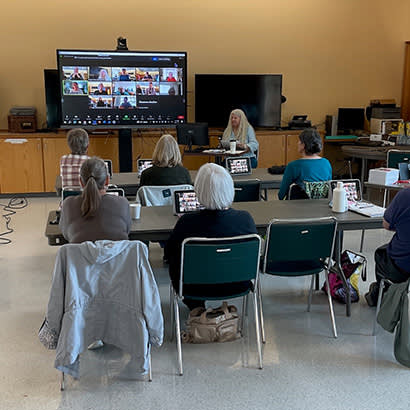
For an enhanced digital experience, read this story in the ezine.
Start where you are, use what you have, do what you can
Newport, Oregon, is a rural coastal town of 10,500 residents — approximately 45 percent of our population is older than 50, and 36 percent is older than 60. When the coronavirus (COVID-19) pandemic reached Newport, our community was hard hit, both physically and emotionally.
Older adults’ lives were, and continue to be, affected disproportionately, resulting in fear, isolation, depression, physical frailty and loss of self-efficacy among many within our older adult population. As volunteers, we scrambled to help the 60+ Activity Center supervisor find alternative ways to provide programming to counter these effects. We also explored, with NRPA’s support, an array of other means to engage with our community from a distance, including electronic systems, to remotely achieve our goals. Walk With Ease (WWE) seemed an ideal program to convert to an online platform. This was followed by converting other activities that were once in-person programs to work within the virtual environment.
As we returned to live, in-person programming, participation by homebound participants dropped considerably. Participation via Zoom often left participants at home feeling even more isolated than if they had not participated at all. As we began to create hybrid Zoom/in-person programs, it became apparent that technological challenges and the inequity of experience between a classroom full of students versus a person by themselves at home left many homebound participants behind.
Seeking Support
Seeking a remedy, we applied to our tri-county IHN-CCO (InterCommunity Health Network Coordinated Care Organizations) Delivery System Transformation Committee for a grant to realize a vision “to develop a hybrid delivery system which would provide WWE participants — whether at home or in the 60+ education room — with an equitable experience. The focus is the mind-body connection, and our goal, to create a community based on common experience rather than on physical location.” The grant application was approved and resulted in a technology-based system utilizing cameras and several monitors. All class members, despite their physical location, are visually represented equally and soon engage as if they are all in the same room.
Our next challenge: how could we reach older adults who are isolated or lonely; who may not have internet service; and who are experiencing loss of strength, loss of balance, depression and/or a dwindling support system? How could we create a technology-based system to be used from home by people with no technology experience? How could we put the “unity” in “community”?
We have achieved this vision, and an equitable, hybrid delivery system is available at no cost to older adults with no computer connection or experience. We pivoted an Oregon Cascades West Council of Governments grant to fund the lease of 10 “GrandPad” devices. The devices allow users who are not computer literate to connect by phone, Zoom or email with their curated list of contacts, personal and medical, without fear of spam, spoofs or robocalls. But the key to our strategy is a one-click button that links users directly to exercise classes or discussions of their choice at the 60+ Activity Center. This connection has proven to be an effective stepping stone, encouraging an increase in behavioral activation by increasing self-efficacy.
Isolated individuals can socialize, new friendships have sprouted, and participants’ chronic pain is being mitigated. Our older adult members who are more mobile have experienced more compassion and less concern about the possibility of spending time physically away from a supportive community. Participants in the most recent hybrid programs have reported dramatic changes in their physical and emotional lives.
An Enduring Impact
Our activities to improve connectivity and reduce isolation will continue, and the impact will benefit participants, community-based organizations and senior living facilities seeking equitable education and exercise program solutions, and older adults seeking help in emergency rooms and hospitals for falls or symptoms that are manifestations of loneliness or depression. Each will have an exciting, accessible tool to improve health outcomes.
The model has been incorporated into additional evidence-based programs at the 60+ Activity Center. In January, NRPA provided a grant to train and certify two instructors in Tai Chi for Arthritis and Fall Prevention. Our second eight-week program started in May and included 14 in-studio and eight remote participants with a 100 percent program completion rate. This hybrid concept will extend to additional programs, thereby increasing equity, connectivity and community. We see this approach to creating a community based on shared needs rather than location is ultimately a suicide prevention program for older adults.
Bryn McCornack is a Volunteer and Advocate for the Newport (Oregon) 60+ Activity Center.

